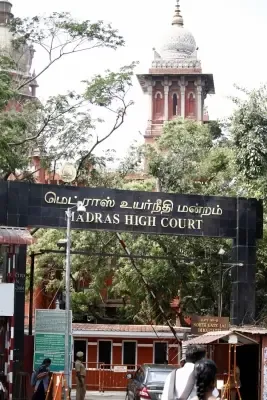Did the Madras HC Confirm Misconduct Against Kancheepuram District Judge?

Synopsis
Key Takeaways
- Madras High Court confirms misconduct allegations.
- Judge Pa.U. Chemmal ordered custody of a DSP.
- Vigilance Committee to review the inquiry findings.
- Coercive actions against local businesses were reported.
- Immediate disciplinary measures are being considered.
Chennai, Sep 23 (NationPress) The Madras High Court has validated claims of misconduct against Kancheepuram Principal District and Sessions Judge Pa.U. Chemmal. Earlier this month, Chemmal ordered the judicial custody of a Deputy Superintendent of Police (DSP) amid a personal conflict involving his former Personal Security Officer (PSO).
Justice N. Sathish Kumar, after reviewing an inquiry conducted by Registrar (Vigilance) Jacintha Martin, instructed the High Court Registry to present the findings to the Vigilance Committee, composed of senior judges, for potential disciplinary action.
He emphasized the urgency of the situation, stating that it was “not conducive” for the judge to remain in Kancheepuram.
This directive followed a petition from the Kancheepuram Superintendent of Police, who contested the district judge’s decision to place the DSP in custody on September 8.
On September 9, Justice Sathish Kumar swiftly overturned that ruling and mandated a vigilance inquiry into the allegations.
As reported by Additional Public Prosecutor K.M.D. Muhilan, statements were gathered from the Superintendent of Police, the DSP, and the judge’s former PSO, R. Lokeshwaran, for the inquiry.
The investigation uncovered that the judge had coerced law enforcement to file charges against Lokeshwaran and his father-in-law, a bakery owner, suspecting them of disseminating false information regarding him. The DSP was reportedly detained for failing to apprehend the former aide.
Moreover, the inquiry revealed additional misconduct, including the judge's alleged attempts to pressure a Food Safety Officer into conducting a raid on the bakery. The FSO confirmed this during his testimony.
The report also highlighted further instances of misconduct, such as undue pressure on a local pharmacy that had declined to dispense medication without a legitimate prescription.
After thoroughly evaluating the findings, Justice Sathish Kumar concluded that the evidence supports the allegations of judicial power misuse. He mandated that appropriate disciplinary actions be initiated as soon as possible.









